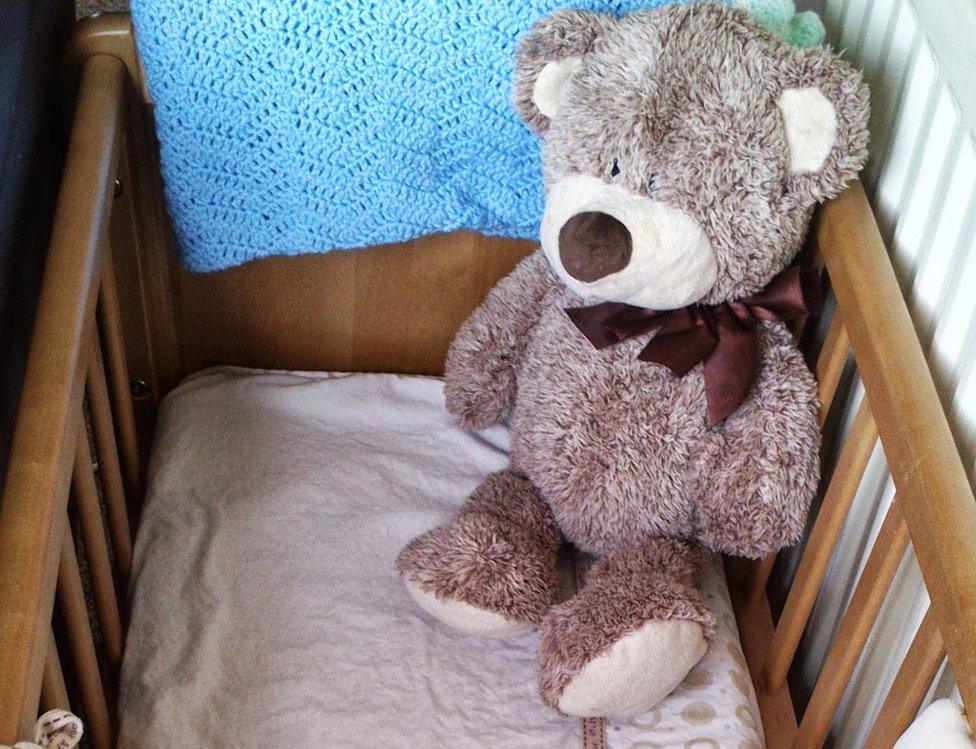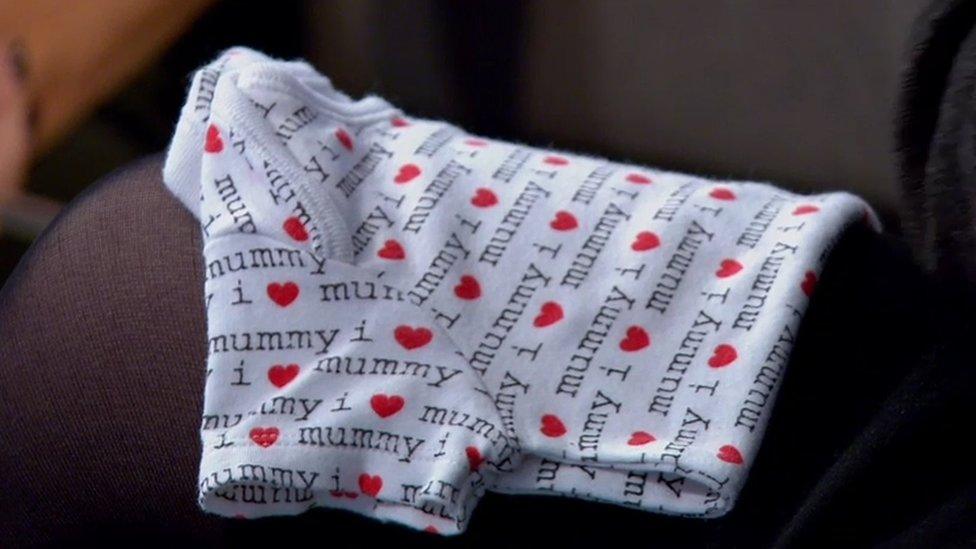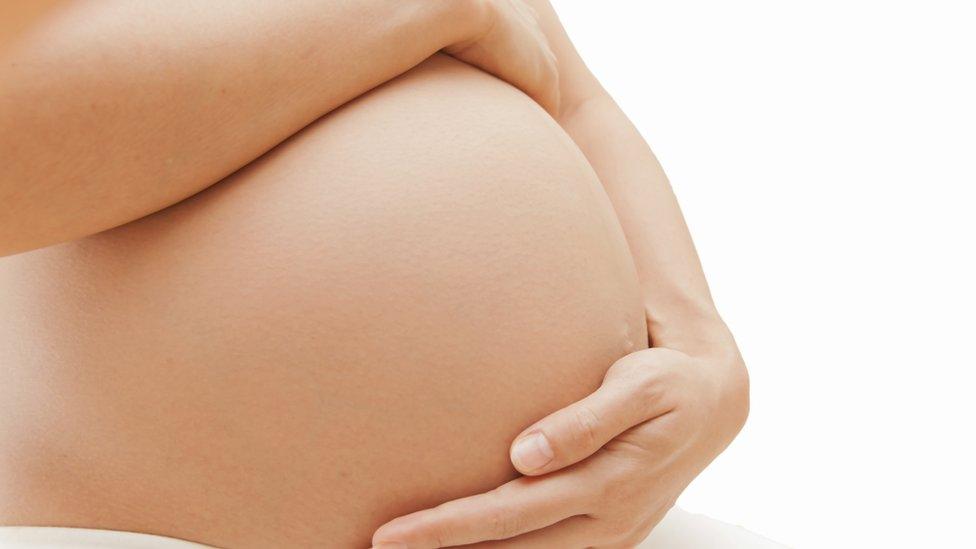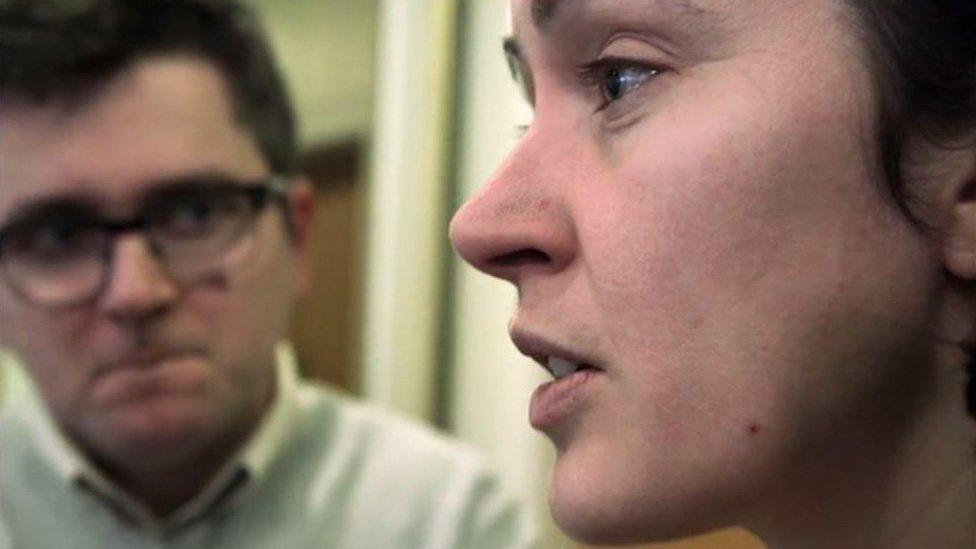The woman who fought to get her baby back
- Published
"I was just crying and weeping and screaming. I felt utter despair. It was the lowest point of my entire life. I felt bereft, I felt like a child, nothing could take the pain away," 'Annie' says.
"Annie" had already had several children taken into care by social services when she had her fifth. But after her newborn was taken into foster care at birth, she decided to fight to regain custody of him.
"I was just crying and weeping and screaming. I felt utter despair. It was the lowest point of my entire life. I felt bereft, I felt like a child, nothing could take the pain away," she says.
Annie Bertram - not her real name - from North Tyneside, previously worked in financial services. In 2013, she was told by a court that her fifth child would be taken into care, with a long-term plan to be established shortly afterwards. He was only six days old.
It was decided that her previous mental health problems, which had led to several of her other children being taken into long-term care, meant there was a future risk she could cause emotional harm to her baby.

The cot prepared in case the baby came home
Throughout her childhood Annie had been subjected to systematic abuse, including sexual assault as a child, and had spent time in the care system. Her relationships with men had often been abusive and destructive, leading to a decline in her mental health.
But by the time of her fifth child's birth, Annie says she had been mentally well for a year.
Annie had taken the witness stand during the court hearing to decide whether her baby should be removed from her care and gave evidence for around an hour - but the circumstances were far from perfect.
"I was six days postnatal, I was still bleeding heavily, I was breastfeeding exclusively so my breast milk was leaking. I'd had to be away from my child in order to go to court," she explains.

Find out more
The Victoria Derbyshire programme is broadcast on weekdays at 09:00 GMT on BBC Two and the BBC News Channel.

"I really fought, I tried really hard, but I was postnatal and sometimes I got confused and wasn't sure how best to make my case."
Annie had brought an outfit for the child to hospital, with the phrase "I love mummy" printed across it, in case the court had taken a different view,
But instead of taking him home, she was left to speak to the foster mother instead - having asked to meet her. She remembers the conversation vividly.
"We instinctively held each other's hands. I said 'I haven't done anything to him' - she said 'I know'.
"She was crying and I was crying. When she went out of the room you could hear her sobbing in the hall."

Annie has been told that when the midwife arrived to tell her it was time to hand over the baby, she was smiling.
"I think it was because I didn't really believe they would take him, I didn't really believe that in this country that a baby could be removed from its mother because of a future risk, when the mother hadn't done anything to this baby.
"I handed the baby over and I've never seen anyone move so quick. She went out of the room and the last thing I saw was this fluffy little head going out the door."
Annie says she instinctively let out an "animalistic howl, just a primal noise". It was "frightening" - at first she didn't even realise the noise was coming from her.
The next step was leaving hospital to go home, but "without my child, with an empty body, empty arms and into a house that was ready for my baby, but he wasn't there".
'This isn't over'
The following day, Annie received a supportive message that read: "You dry your tears, you get up and you fight, as this isn't over."
"There was something about the word 'fight'," Annie says. "I thought 'you're right, I haven't done anything to this child. And actually [my first four children] are either with me, or I have high levels of contact with them.
"I have let my children down in the past but I'm working to repair that - I'm a good mum, this isn't the right thing for my child."
Annie began learning about the law ahead of the next family court hearing - in which a decision on whether her baby would be adopted would be made.
She learned the language of the court and paid particular attention as to how to prove she was changing - that she was engaging in therapy and the behaviours she had engaged in the past were not going to be replicated in future.

Babies taken into care

A local authority can limit parental responsibility if it is seen to be necessary in the interests of the child's welfare
A care order would be sought, from a court, if the child is being caused significant harm
If a care order is granted, the local authority has to decide where the child should live, including being placed into care
Three years ago, 2,018 babies were subject to care proceedings in England, compared with 802 in 2008
Half of the babies were taken from mothers with other children already in care
Source: Citizens Advice and University of Lancaster research

But it was difficult at times. One lawyer said the baby would be adopted and advised that she agree to it. She subsequently made a complaint and found a different lawyer.
At the hearing the council stated it still believed the baby should be placed for adoption because of Annie's history of mental health crises.
The High Court in London, however, had recently restated that adoption orders must be seen as "a last resort" and so North Tyneside Council was asked to return with a new plan for the baby.
When its subsequent proposals - which still suggested adoption - were criticised by the judge, Annie started to believe her child would be coming home.
"My legs just went from under me, I couldn't believe we were going to be back together, he was going to be back where he belonged."
Soon after the hearing in 2014, her baby son went home to live with her.
'I never gave up'
In a statement, North Tyneside Council said that "while proceedings to return the child to his birth mother did take longer than they should have, it is a very complex case and there were many factors that had to be taken into consideration".
"We continue to do everything in our power to support the recovery of this family," the council added.
Reflecting on her battle for custody, and becoming emotional as she speaks, Annie concludes: "All those nights and all those fights and all those days I would see babies and I couldn't bear it as I just wanted him with me was worth it as he was coming home.
"I'm not proud of an awful lot in my life but I'm very, very proud of my children. I'm extremely proud I recognised the local authority's concerns, I took on board what the issues were and I did something about it. I fought and I never gave up."
- Published14 April 2016
